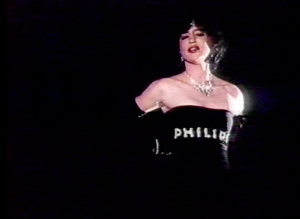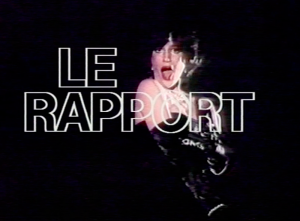JEAN-LUC GODARD and ANNE-MARIE MIÉVILLE
The Darty Report
France, 1989, Video, 50 min.
A Screening as Part of THE DEVIL,…
Saturday, February 1, 3:30pm at NWFC
When Darty, a French appliance chain, called upon Jean-Luc Godard and his partner, Anne-Marie Miéville, to make a promotional film about the company, it’s not hard to imagine Godard spitting on his hands, rubbing them together, and signing the contract in obtrusive letters. Godard has made a career of contaminating arrangements.
One of his big problems has been how to misbehave for fifty years or more. To sustain an intelligent level of bad behavior is not the easiest of tasks for any artist. The Austrian writer Heimito von Doderer put it this way: “One begins by breaking windows. Then one becomes a window oneself.” Godard has tried as hard as anyone to revoke our approval, to continue to be intelligently bad and to keep breaking windows—not for the cheap prize of provocation, but so that he may try to make a form strange in order to resist both his own preconceptions and the weight of others’ opinions.
Production on The Darty Report began in 1987 when Hervé Duhamel was hired to do the camerawork on his own, having been instructed by Godard to “show that there are people who go into the store, who buy things and who go home with them.” But the commercial was only belatedly finished when Godard and Miéville added their own voice-over duet, reciting philosophical texts selected by Duhamel and his wife. The film’s techniques of superimposition and juxtaposition of text and image resemble exercises from the Histoires(s) du cinéma.
You have to wonder how much the people at Darty accepted that they would never get a straight commercial from Godard. How ready they were for sacrifice, penitence, and displeasure. They must have known he would act bad, spank their brand, cry capitalism a foul, and then just gone ahead anyway, putting their faith, however dimly, in the hope that Godard’s own name would garner more attention in the press than a standard-issue commercial. But Godard seemed ready to fail his own name too. Either way, the video was never shown publicly by the Darty company, and it remains an odd, if not somewhat incomprehensible record of Godard’s late video work, a point in his life where it seems that he was insistent on the fact that in every image we must know who speaks and who controls the purse strings.
“When Godard abandoned the movie industry, in 1968, he was fleeing not just a set of narrative conventions, his own public image, and his newfound cinema ‘family,’ but also the entrenched customs of movie production. It was no coincidence that the alternative structure he embraced, a doctrinaire Marxism or Maoism, purported to grant workers control of the means of production and to promote collaborative work….[…] After forming his partnership with Miéville, Godard started managing not only his time but also his budget; his involvement in the art of moviemaking became a matter of business. Generally, his budgets are put directly under his control by the producer, and his take is what is left over. This financial arrangement permits him to bring in people and equipment without regard to specific line items, and lets him shoot and reshoot as he chooses. It also challenges him to put up money when necessary. Yet these contingencies, too, he folds back into his art. ‘What sets me apart from lots of people in the cinema,’ Godard has said, ‘is that money is part of the screenplay, in the story of the film, and that the film is part of money, like mother-child, father-daughter.'”[1]
Jean-Luc Godard was born in Paris in 1930. Today he works in Rolle, Switzerland where he’s lived with Anne-Marie Miéville since 1978. Miéville was born in Lausanne, Switzerland in 1945.
[1] Richard Brody. Everything is Cinema: The Working Life of Jean-Luc Godard. New York: Metropolitan Books, 2008.

